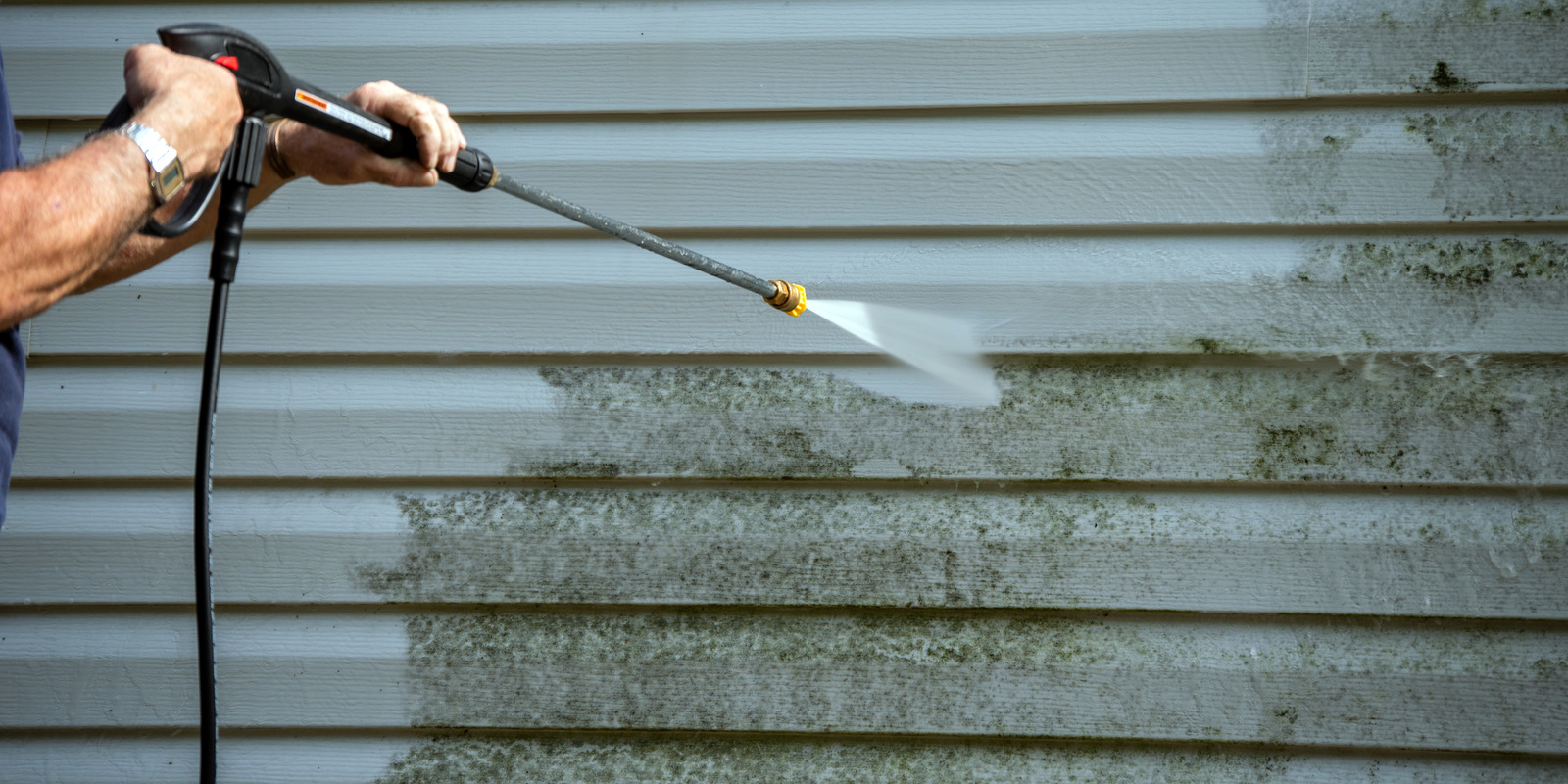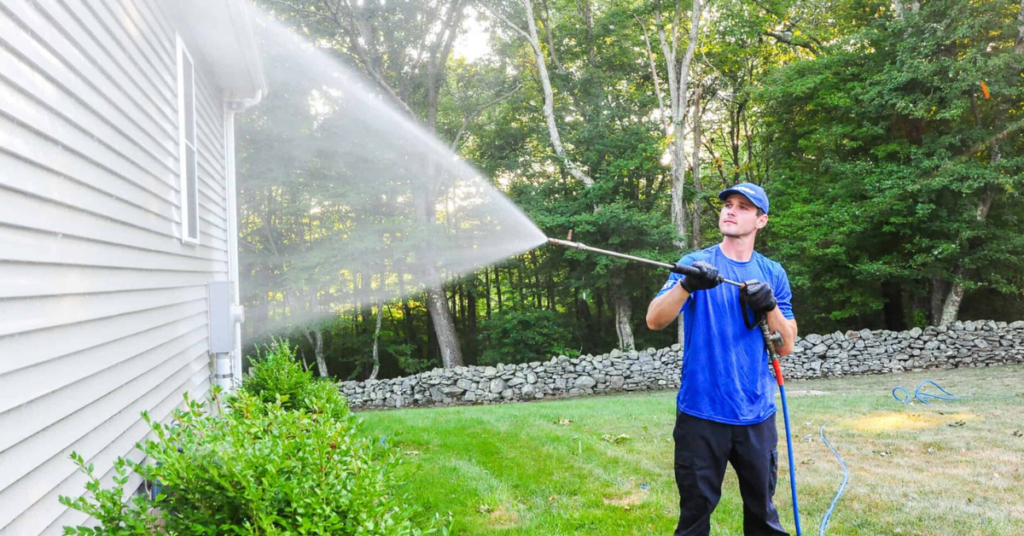Power washing is used to keep your home and business clean and clear. This process includes removing mold and mildew from siding, cleaning outdoor furniture, and clearing driveways of all unnecessary debris. Power washing helps renew and enhance the appearance of your home, making it more attractive.
However, people commonly ask whether power washing delivers the proper results in freezing temperatures, such as during winter. Yes, you can achieve proper results, but you need to take some care and tips. Hiring professionals who follow proper techniques and practices is best to ensure optimal results.
We have provided a complete guide here that will be beneficial for you.
Challenges of Power Washing in Winter
Power washing in winter is challenging because the freezing temperature causes water to freeze quickly. This can potentially damage equipment. We have also discussed some of these issues here.
Freezing Temperatures
Due to low temperatures, water builds up as ice on hoses and surfaces, and slippery conditions develop. This not only affects cleaning but can also damage equipment and create a safety risk. It can even cause water to freeze inside your pipes, leading to cracks and bursts.
Slippery Surfaces
Winter weather and snow make surfaces slippery, which affects your power washing results. Icy surfaces don’t get cleaned properly and also create safety risks. Water freezing in pipes can also lead to cracking and warping issues.
Equipment Performance
A power washer is designed to handle tough conditions, but extreme cold affects its performance, preventing it from working properly.
Ineffective Cleaning
Warm water is more effective for cleaning compared to cold water. Power washers are specifically designed to remove mold and dirt. However, some chemicals freeze in cold temperatures, preventing the power washer from delivering proper results.
Shorter Work Window
Winter shortens the days, and the weather can change unexpectedly, reducing the available daylight. Due to low temperatures, work often needs to be stopped and restarted, which affects results and takes more time.
Personal Safety aur Comfort
In freezing conditions, water freezes quickly, making sur
faces slippery, which can lead to freezing and safety risks. Wearing waterproof gloves and non-slip boots is essential for safety.

Essential Tips for Power Washing in Winter
Use Heated Water
Removing dirt and mold in freezing temperatures can be challenging. However, if your power washer has a heated water option, it will give much better results. It prevents water from freezing quickly and helps clean grease, mold, and grime faster to ensure the best results.
Protect Your Equipment
Low temperatures also affect your equipment, making it difficult to operate. Always store your equipment in a dry or heated place or use insulated hose covers to ensure better performance.
Work During the Warmest Part of the Day
When planning work, choose a time with the most daylight, such as late morning or early afternoon. Try to work when the temperature is above 35°F, as this prevents water from freezing.
Don’t Skip the Detergent
Freezing temperatures also affect detergent performance. Some chemicals and detergents may not deliver the best results for your clients. But there’s no need to worry. Some detergents are specifically designed for low temperatures. Always choose high-quality detergents and chemicals that provide the best results, even in cold weather
Focus on Small, Manageable Areas
If you’re doing power washing in winter, you should start with small areas. Due to changing weather, daylight is limited, and this method also reduces the risk of patches freezing.
Pay Attention to Safety Measures
Cold weather increases safety risks as chemicals and water create slippery conditions. That’s why you should always use proper safety layers, non-slip boots, and waterproof gloves.
When to Avoid Power Washing in Winter
Power washing in winter is very challenging because it will create many issues. In some situations, power washing gives unsatisfactory results and creates safety risks. In such cases, avoiding power washing is the best preference.
Here, we mentioned some tips on when to avoid power washing in winter below.
When Temperatures Are Below Freezing
Power washing becomes completely unsafe when the temperature drops below the freezing point (32°F). In such conditions, water freezes instantly, creating slippery surfaces that increase the risk of mishaps. It’s best to avoid power washing in these temperatures to prevent damage to surfaces and equipment.
Lack of Proper Equipment
If you don’t have the proper equipment, you should never do power washing. If your power washer doesn’t have a heated water option, you should avoid power washing in winter. Cold temperatures make it difficult to remove mold and mildew, which is why heated power washers are used to prevent water from freezing too quickly. Using cold water not only fails to deliver proper results but can also damage your equipment.
During Snowstorms or Heavy Rain
It’s raining, snowing, or windy; it makes power washing even more difficult. These conditions affect the cleaning process and make it unsafe. Working on wet surfaces won’t deliver suitable results and may also risk damaging your equipment. Bad weather creates safety hazards, so always check the weather forecast before starting work.
When the Surface Is Already Damaged
Power washing uses high pressure to effectively clean mold and dust. However, if your surface is damaged or cracked, pressure washing can worsen the damage, leading to costly repairs. That’s why it’s best to inspect surfaces beforehand. If repairs are needed, get them fixed promptly to avoid expensive repairs later.
Conclusion
Power washing is an effective way to clean your home’s outdoor furniture, siding, and driveway. However, if you plan to power wash in winter, you will face many challenges and issues that can make the process complex.
We have briefly explained various situations to help you make an informed decision. If you want to proceed with power washing in winter, it’s best to hire a professional and reliable company. Their experts use proper techniques to ensure the best and most effective results.
Always check the weather forecast to choose the right day, follow proper instructions, use all necessary equipment, and take care of surfaces, equipment, and safety. To obtain ideal conditions, follow expert guidance and consider alternative methods when needed.



